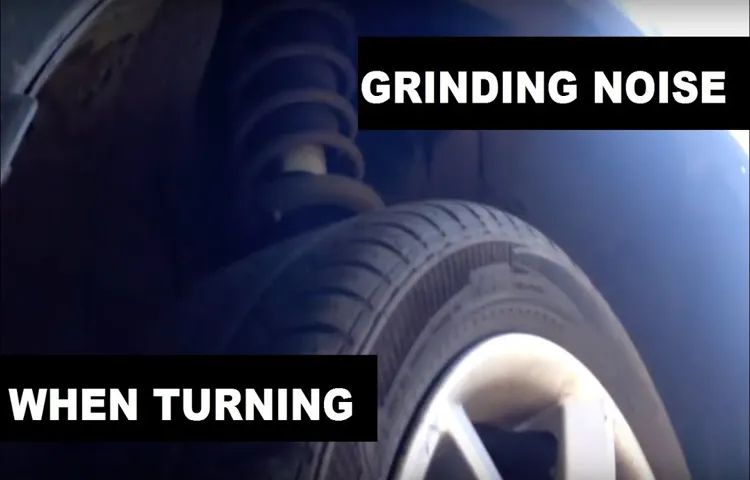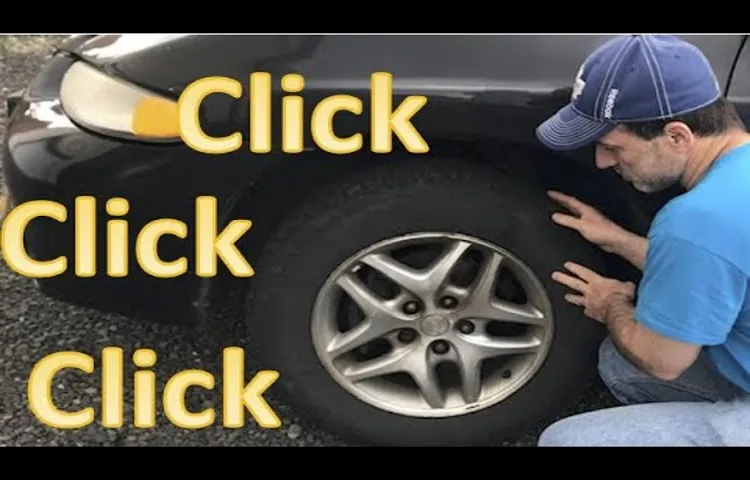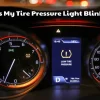Have you noticed a clicking noise coming from your tire when turning? It can be an alarming sound that may leave you wondering what’s going on under the hood. The truth is, there are a few reasons your tire might be making that sound. In this blog post, we will explore some of the common causes behind a clicking tire and what you can do to fix the problem to keep your vehicle in great condition.
So, buckle up, and let’s get started!
Table of Contents
Possible Causes
If your tire makes a clicking noise when turning, there are a few possible causes to investigate. First, it could be a sign of worn or damaged CV joints. These are part of the drivetrain and help transmit power from the engine to the wheels.
Over time, the CV joints can wear down or become damaged, leading to a clicking or popping noise when turning. Another potential culprit is a failing wheel bearing. This component helps support the weight of the vehicle and allows the wheels to spin smoothly.
When a wheel bearing begins to fail, it can produce a clicking or grinding noise that may be more noticeable when turning. Finally, it’s possible that the tire itself is the source of the clicking noise. This may be due to worn tread, loose lug nuts, or a foreign object lodged in the tire.
Whatever the cause, it’s important to address the issue promptly to ensure safe driving and prevent further damage to your vehicle.
Worn CV Joints
Worn CV joints can cause problems for your vehicle, leading to a variety of issues that you’ll want to avoid. Some possible causes of these issues could be a lack of proper lubrication, exposure to the elements, or simply wear and tear over time. When your CV joints start experiencing problems, you might notice clicking or popping sounds when turning, as well as vibrations or shaking while driving.
It’s important to get your car checked out if you’re experiencing any of these symptoms, as ignoring CV joint issues can lead to further damage and potentially dangerous conditions on the road. So if you’re experiencing issues with your vehicle’s CV joints, don’t hesitate to bring it in for an inspection and maintenance.

Faulty Wheel Bearings
If you’ve been experiencing an unusual humming or grinding noise coming from your wheel, it could be a sign that your wheel bearings are faulty. There are several possible reasons why your wheel bearings may start to wear out. One common cause is lack of lubrication, which can subject the bearings to extra friction and heat.
Another potential issue is the accumulation of dirt and debris, which can compromise the bearings’ smooth operation and cause wear over time. Additionally, excessive vibration or heavy impact can also cause damage to the wheel bearings. Regardless of the cause, it’s essential to have your car’s bearings inspected and replaced as soon as possible to avoid further damage or costly repairs down the line.
So, if you’re hearing strange noises coming from your wheels, don’t hesitate to visit your local mechanic or auto shop for a thorough checkup.
Loose Lug Nuts
If you’ve ever experienced loose lug nuts on your vehicle, you know firsthand how unsettling it can be to feel your wheels wobbling down the road. Loose lug nuts can be caused by a variety of issues, including poor installation or maintenance, worn out hardware, or even improper torquing. However, one of the most common causes of loose lug nuts is simply failing to properly check and tighten them on a regular basis.
Neglecting this important maintenance task can result in dangerous driving conditions, as the wheels may become detached from the vehicle while in motion. To avoid this scenario, it’s crucial to make sure your lug nuts are securely tightened and regularly inspected by a qualified mechanic. Don’t leave your safety to chance – always prioritize the health and maintenance of your vehicle.
Diagnosis
If you’re hearing a clicking noise when turning, it’s possible that your tire is to blame. This noise could be a sign of a damaged CV joint or a worn-out axle. In either case, it’s critical to get your car checked out by a professional as soon as possible.
Continuing to drive on a damaged tire could lead to more significant issues down the line, such as a blown-out tire or even a potentially dangerous accident. So, if you’re hearing that clicking noise, don’t wait to take action. Get your car to a mechanic right away so they can diagnose the issue and get you back on the road safely.
And don’t forget to regularly check your tires for signs of wear and tear to prevent issues down the line!
Visual Inspection
Visual inspection is an important technique used in many industries to identify and diagnose problems within products or machinery. Often, the first step in a repair process, visual inspection involves the careful examination of an object’s exterior surfaces, looking for any signs of damage, wear, or failure. This can include scuffs, cracks, dents, or any other evidence of possible issues.
The goal is to identify any areas that require further investigation or repair to avoid potential damage or failure. In fields such as manufacturing, construction, and aviation, visual inspection is critical to ensuring safety and quality control. By utilizing this technique, professionals can quickly diagnose problems and take appropriate actions before they become more severe.
Overall, visual inspection is an important tool that allows professionals to identify potential issues before they escalate into serious problems.
Test Drive
When it comes to diagnosing issues with your car, taking it for a test drive can be crucial. A test drive allows you to experience the problem firsthand, which can help your mechanic better understand what’s going on and suggest the right repairs. When you take your car out for a test drive, pay attention to how it handles and makes noises as you drive.
If the issue is with the brakes, pay attention to how they feel when you apply pressure. If the issue is with the engine, listen for any strange noises. It’s essential to relay this information to your mechanic to ensure an accurate diagnosis.
Don’t be afraid to ask questions or provide additional details about the problem to help your mechanic pinpoint the issue. A thorough diagnosis can save you time and money in the long run. So, the next time you notice your car acting up, take it for a test drive and provide your mechanic with as much information as possible for a proper diagnosis.
Tire Clicking Noise: Repair and Replacement
Have you noticed a clicking noise from your tires when turning? This can be an indication of various issues, ranging from minor to severe ones that need immediate attention. One common cause of this noise is a worn-out or damaged CV joint. If left unattended, this problem can result in significant damage to the axle and transmission.
Another cause of a clicking noise could be a damaged or loose wheel bearing. This can affect the car’s stability and handling, and if not repaired, could lead to a dangerous driving scenario. Finally, if the clicking is heard in tandem with a flat or damaged tire, it’s crucial to take it in for a replacement as soon as possible, as driving with a damaged tire could lead to a blowout.
Regardless of the cause, if you hear a clicking noise from your tires, it’s better not to ignore it and have a professional mechanic take a look at it.
CV Joint Replacement
CV joint replacement is essential for maintaining your vehicle’s long-term health. If you hear a clicking or popping noise when turning or accelerating, it could be a sign that your CV joint is damaged or worn out. The CV joint is responsible for transferring torque from the transmission to the wheels, so it’s vital to keep it in good condition.
A damaged or worn CV joint can cause vibration while driving, which can lead to more severe problems, such as tire wear and steering problems. When it comes to repairing or replacing your CV joint, it’s essential to trust a reliable and experienced mechanic. They will typically start by inspecting the CV joint to determine the extent of the damage and whether a repair or replacement is necessary.
In many cases, it’s more cost-effective to replace the CV joint entirely rather than attempting to repair it, especially if the damage is severe. A CV joint replacement typically involves removing the axle shaft from the vehicle and replacing the worn-out joint. The mechanic will also inspect and replace any damaged and worn components, ensuring a smooth and safe ride.
Remember, it’s crucial to address any strange noises or vibrations coming from your vehicle as soon as possible to prevent further damage and costly repairs down the line. In summary, if you’re experiencing a tire clicking noise when turning or accelerating, it could be a sign of a damaged or worn-out CV joint. Trust a reliable and experienced mechanic to diagnose the problem and recommend a repair or replacement solution.
Get your CV joint replaced to prevent further damage and keep your vehicle running smoothly for years.
Wheel Bearing Replacement
If you’re hearing a clicking noise coming from your vehicle’s tires, it’s possible that your wheel bearings might need attention. This problem is more common than you might think and can be caused by normal wear and tear or damage. Wheel bearings are essential components of your vehicle’s suspension system, allowing your wheels to rotate smoothly and quietly.
When they begin to wear out, they can start making noise and lead to steering issues or even serious accidents. To avoid these problems, it’s important to have your wheel bearings checked regularly and replaced if necessary. A professional mechanic can diagnose the problem and install new bearings to ensure your vehicle stays running smoothly and safely.
Remember, regular maintenance can go a long way in preventing costly problems down the road. So, if you’re hearing a clicking noise, don’t delay–get your wheel bearings checked today!
Tightening Lug Nuts
If you hear your tires making a clicking noise, it could be a sign that something is wrong with your lug nuts. The lug nuts are responsible for keeping your wheels securely attached to your car, so it’s important that they are tightened correctly. If your lug nuts are loose, the wheel can wobble, causing the clicking noise you hear.
To repair this issue, you will need to have a professional mechanic tighten your lug nuts to the manufacturer’s recommended torque specifications. If you ignore this issue, it could lead to more severe problems like damage to your wheel studs or even the loss of a wheel while driving. So, it’s always better to be safe than sorry when it comes to your car’s safety.
Take care of your lug nuts and get any clicking noise checked out by a trusted mechanic to ensure your vehicle is running smoothly and safely on the road. Remember, prevention is key to avoiding more significant problems in the long run.
Conclusion
In summary, when your tire makes a clicking noise while turning, it’s a clear indication that it’s time to pay a visit to your friendly neighborhood mechanic. Don’t be too hard on your tire, though; it’s just trying to tell you something important. Think of it like a nagging reminder that you can’t ignore.
So listen to your tire, get it fixed, and cruise on down the road to smoother, quieter drives.”
FAQs
What could be the reason for my tire to make a clicking noise when I turn?
The clicking noise when turning could be due to worn-out CV joints or axle bearings.
Is it safe to drive a car if the tire makes a clicking noise?
It is not safe to drive a car with a clicking noise as it could lead to further damage and compromise your safety on the road.
How can I diagnose the source of the clicking noise in my tire?
A professional mechanic can diagnose the clicking noise in your tire by inspecting the CV joint, bearings, and the suspension system.
Do I need to replace the tire if it makes a clicking noise?
No, you do not need to replace the tire itself, but you need to address the underlying issue that is causing the clicking noise.
How much does it cost to repair the clicking noise issue in my tire?
The cost of repair depends on the source of the clicking noise, it could vary from a few hundred dollars to over a thousand dollars.
Can I drive with a clicking noise until I can afford to fix it?
It is not recommended to drive with a clicking noise as it could lead to further damage and eventually result in a more costly repair.
Is it common for tires to make a clicking noise when turning?
No, it is not common for tires to make a clicking noise when turning, and it indicates an issue that needs attention.



